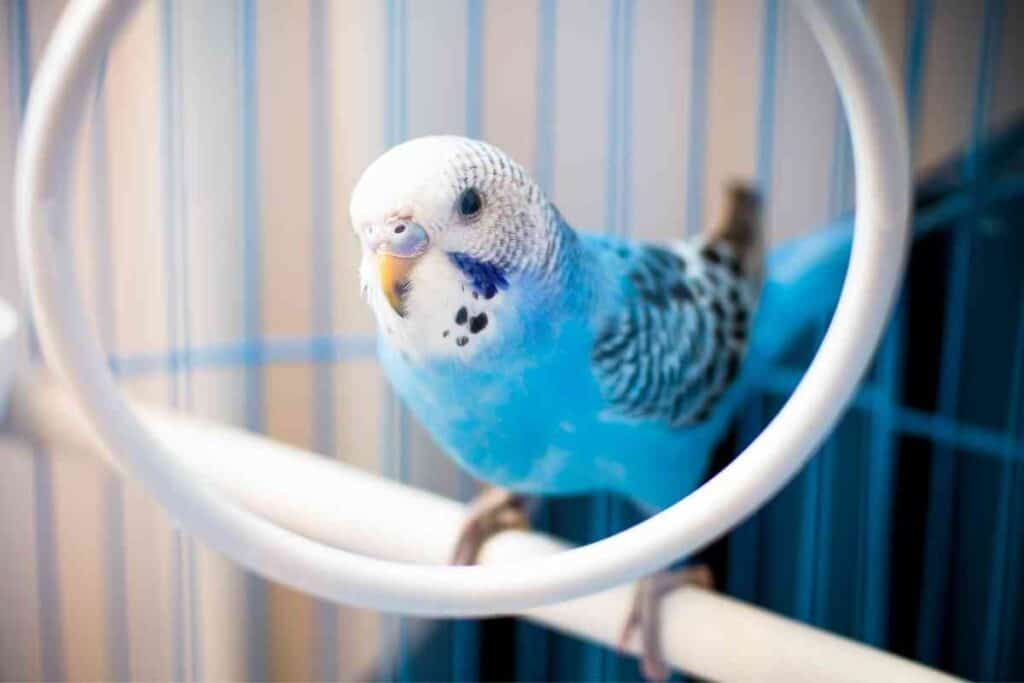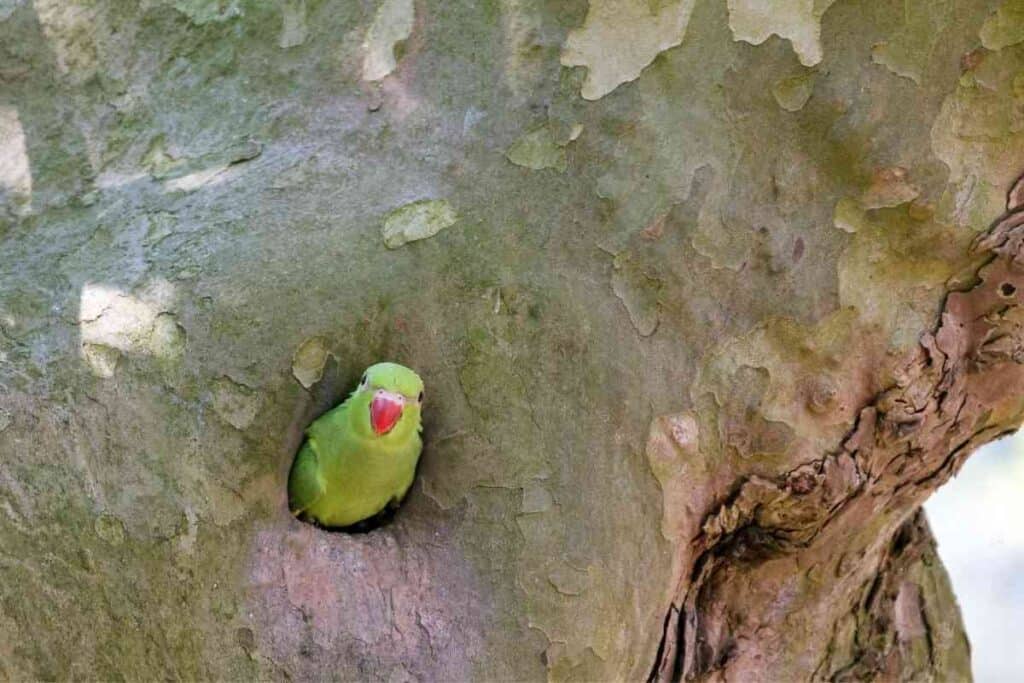Can Parakeets See In the Dark?
Parakeets are fascinating birds that you are sure to enjoy in your home. They are colorful, smart, and can make wonderful entertainment for everyone. As you bring a parakeet into your home, you may wonder whether this bird is able to see well in the dark, or can they only see when it is nice and bright outside.
Can Parakeets See In the Dark?
Yes, parakeets can see in the dark. Parakeets are able to see more light than the human eye, which will help them to find even small things in the middle of the night. Not only can they see, but you may be surprised by what your parakeet gets up to in the dark when you can’t see them.
Night vision is useful to them in the wild because they can find their food while flying around undetected by predators in the area. While this is not as useful for those parakeets in captivity, many will still be able to see just fine at night in your home.
Let’s take some time to learn more about how the eyes of a parakeet works, whether they like to be in the dark when they are in your home, and some of the reasons why parakeet eyes work so well in the dark.
Do Parakeets Have Night Vision?
Parakeets are able to see in the dark. In fact, they have great vision, even when it is completely dark outside or in the room.
This is why some may still be awake at night. They are able to see what is going on around them. You may be surprised at how well this bird is able to see when it comes to being in the dark.
The reason that your parakeet is able to see so well in the dark is that they have an abundance of blood vessels throughout the eyes.
These blood vessels are known as pecten Oculi, which will provide them with sharper focus and more clarity than what humans may have. This is considered to be more of a biologically driven trait since they were wild birds who needed to be able to fly around and find food at night when they were less likely to be seen by predators.

How Does Parakeet Eyesight Work?
It is not uncommon for birds to see things that humans struggle with. This helps them to travel through the night to find their food without being attacked by other birds or predators.
To understand better how a parakeet is able to see, we need to look more at how human eyesight will work too.
Humans will have just three color receptor cells in their eyes, which are known as cones. These help us to see the three colors of green, red, and blue. Mixtures of these hues is how we will see other colors around us too.
For a parakeet, there are four cones and it is the fourth cone that will help them to see ultraviolet light on the color spectrum as well. This will make it easier for them to see the world around them.
Like many other birds, parakeets can see this ultraviolet light, which is important for their own survival since they would normally be a wild bird.
The parakeet has been able to use their eyes for generations to help them look through grasslands to find seeds and other insects that they like to eat. This eyesight can make it easier for them to survive.
Are Parakeets Okay Being in the Dark?
When parakeets are placed in the dark when they are wild, they are capable of going about their lives just fine. The sharp eyesight will make it easier for them to see things in fine detail so they can find the best food when they are out in the wild.
Due to the nature of their eyes and the way that they use these eyes, the parakeet is going to be perfectly safe, and even biologically adapted, to these darker conditions. This is not a new thing for them.
While you probably should not leave them in the dark all of the time, they will be fine when left in the dark on occasion and it may even be good for their eyesight as well.
Does My Parakeet Like the Dark?
Parakeets that are left in the wild will have a lot of freedom to go about their lives and do what they want when it is dark. Many will spend a lot of time flying around at night and eating because they can do so without a predator attacking them.
They will utilize their sharp eyesight a lot during night when they are in the wild.
You do have to remember that a parakeet who is in captivity will not be able to exercise their eyes in the same way. This is because they have not had the chance to develop the muscles of the eyes like their counterparts in the wild. Depending on how you breed and raise the parakeet, they may not react to being in the dark in the same way.
It is not uncommon for parakeet owners to notice that their bird will act strange at night and they may feel concerned that their parakeet is afraid of the dark. In some cases, this could be true.
When the parakeet is placed into a new environment that they are not familiar with, they may act like they are afraid. Over time, your parakeet will get used to being in the dark and will be able to calm down.
Adding a dim lamp into the room pointed away from them can help as they adjust to things being a little darker.
Sometimes the strange behaviors that you notice at night are not fear from the bird. It could be a sign that the parakeet is displaying some of their natural instincts from the wild and they are ready to be active when the lights go out.
If the cage allows for it, then add some perches or put the bird higher up. This allows the bird to survey the ground below them and can help them to feel more active while they are up at night.
Check out our list of essential Parakeet toys for some cage remodeling ideas.
Should I Cover My Parakeet At Night?
There is nothing out there that says all parakeets need to be covered at night, but this will depend on each bird. Some parakeets will be able to sleep without a cover on their cage, and others will struggle to fall asleep without this over them. You will have to take some time to learn more about your bird and what seems to work the best for you.
Many parakeets, when they are in the wild, will sleep in the cavities of trees. They like this because the area offers warmth and some security to them.

For some birds, having that cover over the cage will offer the same feeling to the parakeets. If you have had the parakeet for some time and they seem happy without a cover, there is no need to introduce it now.
If you do want to add in a cave cover because you think it will help your bird, then you need to go with one that is non-toxic and has breathable materials so your parakeet will be comfortable while they sleep.
Can My Parakeet Sleep in the Dark?
Yes, your parakeet will be able to sleep in the dark. Your parakeet can sleep happily for up to 12 hours when it is night. Your parakeet will need to sleep for this long so that they remain in peak health. If the parakeet Is unhappy, finds the room to be too cold or too noisy, or they are stressed, they may not get enough sleep and can start to see their health suffer.
Some parakeets will stay up a little bit at night. This is often due to instinctive behaviors. Giving them a place to look down on things and use those strong eyes, such as putting them up high at night, can help them.
They will get to use those instincts a little bit and when they are done, they will go to bed at night. Most parakeets that you would have in your home will be able to sleep in the dark at night and should not keep you up all night.
Parakeets and Their Night Vision
Parakeets have really good vision that allows them to see well when they hunt at night. This gives them a chance to get the food they need without being seen by predators while they fly around.
They get this good eyesight because they are able to see more colors than the human eye, which makes them safer when in the wild. While a parakeet does not necessarily need this good vision when they are flying around your home, it is a genetic trait that they bring with them.
